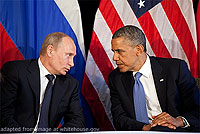Cooling-off won’t stop Russia-U.S. cooperation – expert

(Interfax – August 13, 2013) The pause in U.S.-Russian relations suggested by U.S. President Barack Obama will be temporary, Federation Council International Affairs Committee Chairman Igor Morozov said.
“The absence of a strategic dialogue between Washington and Moscow will be inconsistent with the national interests of both countries because neither Russia nor the United States can solve pressing problems threatening global and national security unless they pool their resources. So, the break proposed by President Obama will be temporary,” Morozov told Interfax.
Despite the cooling-off period in Russia-U.S. relations, the sides have a broad opportunities for cooperation, such as efforts at stopping and containing the proliferation of weapons of mass destruction and the means of their delivery, the settlement of existing local conflicts and the prevention of new ones, and the suppression of international terrorism and drug trafficking, he said.
Morozov is inclined to view the U.S. president’s statement as a domestic policy move. “The Obama administration is experiencing massive criticism both from the Republicans and Democrats. So, Obama has practically no space to maneuver. Criticism is particularly harsh from the Republicans who held their latest election campaign under the slogan of U.S. exclusivity and gained the majority of seats in the Congress. The Republicans continue to exploit that slogan in their foreign policy and demand that Obama act from a position assuming the United States’ global leadership and the need for all states to mind U.S. strategic interests in their policies. Obama has to play up [to these demands],” Morozov said.
The opinion that a new “Cold War” period has begun in the bilateral relations is incorrect and unfounded, he said.
“If you remember the Cold War years you must also remember that even after the Cuban Missile Crisis, none of the American presidents, from Lyndon Johnson to Jimmy Carter, avoided dialogue with the incumbent Soviet administration although the United States and the Soviet Union had much more serious disagreements than the current one over Snowden,” Morozov assumed.
“The United States and Russia are the two main nuclear actors on the global arena and their cooperation is inevitable, especially on such strategic issues as the situations in Afghanistan, Iran and North Korea,” he said.
Moscow and Washington have serious differences over Syria, but the United States will not be able to achieve the settlement in Syria and the Middle East as a whole without the active participation and cooperation of Russia, he said.
The Federal Council member is confident that, irrespective of the feelings of the U.S. political establishment, Russia-U.S. relations will not be thwarted in such strategic areas as Afghanistan, especially given that U.S. military transit goes through Russian territory.
“There are also real threats related to the U.S. pullout from that country (Afghanistan) to the region as a whole and Central Asian countries bordering Afghanistan. The United States realizes that it would be impossible to withdraw its servicemen from Afghanistan with minimal losses without Russian assistance,” Morozov said.
There will be also cooperation in Syria, including the arrangements for the upcoming international peace conference. “Missile defense is a no less significant dimension of our cooperation. This subject is raised at every Russian-U.S. meeting,” Morozov said.
